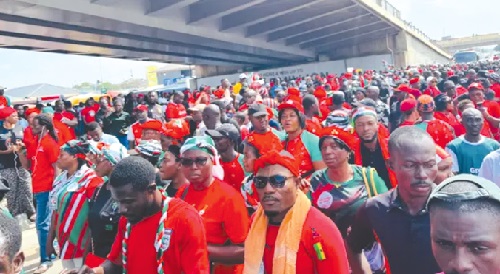A common outcome of turnover elections is post-regime accountability.
This is where a newly elected government, having promised to fight corruption during the campaign, takes active steps to hold officials of an outgoing government accountable for alleged acts of impropriety during their tenure in office.
At the heart of good governance is accountability, so any actions by a government to uphold this principle must be applauded.
But after four turnover elections, post-regime accountability must contend with the increasingly partisan and polarising nature of our politics.
Partisan Reaction
Post-regime accountability, since the first turnover election (2000) of the Fourth Republic, appears to draw two distinct responses from partisans.
![]()
Minority Members of Parliament marching to the offices of EOCO in solidarity with Bernard Antwi Bosiako following his arrest and detention
For ruling party partisans, whose newly elected government is wielding the post-regime accountability stick, it receives their full support.
For partisans of the main opposition party, who are at the receiving end, post-regime accountability is described with phrases such as “witch hunting,” “political persecution,” etc.
This posture can lead to the erroneous impression that partisans only support post-regime accountability when in power.
I do not believe that is the case.
Partisans, in principle, are not opposed to public officials being held accountable for alleged acts of impropriety.
They, however, in my opinion, face a political dilemma on two fronts.
First, is the struggle of how to reconcile support for fellow members or people who served in their party’s government without appearing to encourage misconduct in public office.
As Hon. Ken Agyapong rightly said in a video I watched, his decision to provide surety for an accused person (Prof. Ameyaw-Akumfi) must not be construed as support for alleged acts of corruption but rather a belief that everyone is entitled to due process.
Second, is how opposition party partisans (previously ruling party partisans) reconcile past attitudes towards complaints by their political opponents (now ruling party partisans), who in the recent past were at the receiving end of post-regime accountability with their current demands.
This past week has seen claims and counterclaims from partisans of our duopoly illustrating this vicious cycle.
The unfortunate consequence of this cycle is that, should it persist over the lifecycle of additional turnover elections; it potentially weakens and delegitimises any post-regime accountability efforts.
If not, which I am sure most people will agree with, how do we approach post-regime accountability in a way that gets us out of this vicious cycle?
First, governments must devote the same amount of energy to in-regime as they do to post-regime accountability efforts.
If incumbent governments can muster the political will to hold their officials accountable for alleged acts of corruption, it diffuses the potency of describing post-regime accountability efforts in the manner we tend to observe when an opposition party comes into office because of a turnover election.
The creation of the Office of Special Prosecutor, in my view, was to help deal with this.
Perhaps, with time, this will become routine.
Second, state institutions, that are administratively responsible for the day-to-day operations of these post-regime accountability efforts, must exercise behaviour that can stand public scrutiny, especially in terms of how suspects are treated.
This ensures that the focus remains on accountability efforts and not the actions of state authorities.
This is critical because trust in institutions is shaped by partisan attachments.
I have often wondered why partisans tend to have slightly more trust in institutions when their preferred political party is in power compared to when in opposition.
For example, in Afrobarometer Round 4 (2008), 56 per cent of self-described NDC partisans trusted the courts “somewhat/a lot” compared to 66 per cent of self-described NPP partisans. In Round 6 (2014), it was 58 per cent for NDC partisans compared to 31 per cent for NPP partisans.
In Round 10 (2024), it was 29 per cent for NDC partisans compared to 48 per cent for NPP partisans.
When administrative behaviour fails to stand the test of time, it has the unintended consequence of undermining the legitimacy of efforts designed to hold public officials accountable, especially in an environment of mistrust.
Third, partisans of the country’s two main political parties have experienced both incumbency and opposition.
That means they have experienced, especially being at the receiving end of post-regime accountability efforts by a sitting government.
Perhaps the lessons of those experiences can shape future practices and help the country to break this vicious cycle.
Future of Ghana’s Democracy
For the sake of the country’s democracy and the efforts to ensure it remains resilient, the need for accountability is key.
This means we cannot afford the luxury of sacrificing accountability on the altar of partisan politics enabled by the unintended consequences of state administrative behaviour that cannot withstand public scrutiny.
The writer is the Project Director, Democracy Project.

